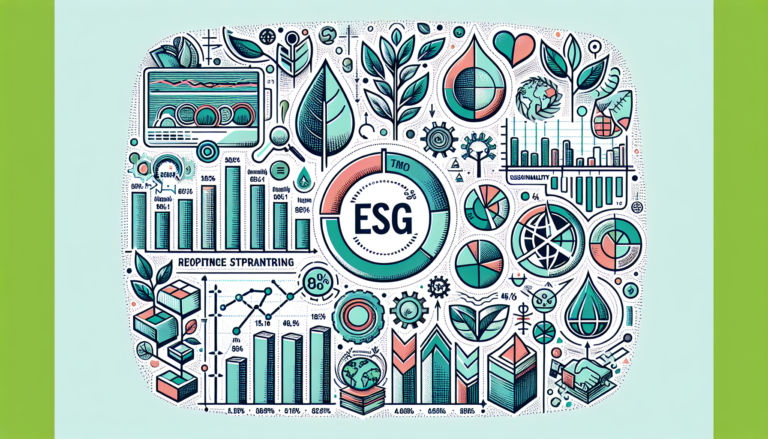Exploring the impact of BlackRock’s ESG fund on investments
The BlackRock ESG fund integrates environmental, social, and governance criteria into investing, promoting sustainable practices while potentially enhancing financial returns for investors.
BlackRock’s ESG fund is making waves in the investment community by emphasizing sustainability. As investors increasingly seek ethical opportunities, understanding the dynamics of ESG funds is more crucial than ever.
Understanding ESG investing
Understanding ESG investing is vital for modern investors who want to align their financial goals with their values. ESG stands for Environmental, Social, and Governance, focusing on criteria that evaluate a company’s ethical impact and sustainability practices. Investors are increasingly recognizing that these factors can affect a company’s long-term performance.
What are the Components of ESG?
The three components of ESG investing are:
- Environmental: This includes a company’s efforts to reduce its carbon footprint, manage waste, and utilize resources sustainably.
- Social: This focuses on how a company manages relationships with employees, suppliers, customers, and the communities where it operates.
- Governance: This pertains to a company’s leadership, executive pay, audits, and shareholder rights.
Why is ESG Investing Important?
ESG investing is important because it identifies risks and opportunities that traditional financial analysis might miss. Companies with strong ESG practices tend to perform better in the long run, making them attractive to responsible investors. Moreover, consumers are increasingly gravitating toward brands that demonstrate a commitment to sustainability.
How to Start ESG Investing
To begin ESG investing, consider assessing your values and priorities. Research funds or companies with strong ESG ratings and consider using ESG rating tools to help identify which companies align with your goals. Building a diversified portfolio with ESG factors in mind can offer both ethical satisfaction and financial reward.
BlackRock’s role in sustainable finance
BlackRock plays a significant role in sustainable finance by integrating environmental, social, and governance (ESG) factors into its investment strategies. As one of the world’s largest asset managers, BlackRock has the power to influence companies and promote sustainability practices on a global scale.
Driving ESG Integration
BlackRock has committed to incorporating ESG considerations into its investment processes. This means assessing companies not just on financial metrics but also on their environmental impact and social responsibility. By doing this, BlackRock aims to help clients achieve better long-term returns while contributing to a more sustainable future.
Influencing Corporate Behavior
With substantial voting power in shareholder meetings, BlackRock can advocate for corporate policies that prioritize sustainability. This influence encourages companies to adopt more rigorous ESG practices, such as reducing carbon emissions and enhancing workforce diversity.
Innovative Financial Products
BlackRock has developed various financial products dedicated to sustainable investments. These include ESG-focused funds and exchange-traded funds (ETFs) that allow investors to align their portfolios with their values. These products offer a way for investors to support companies that are committed to positive environmental and social outcomes.
Commitment to Climate Initiatives
In response to growing environmental concerns, BlackRock has announced ambitious plans to achieve net-zero carbon emissions across its portfolio by 2050. This commitment highlights the firm’s dedication to a sustainable future and encourages others in the financial industry to take similar actions.
Key features of BlackRock’s ESG fund
The key features of BlackRock’s ESG fund make it a noteworthy option for investors interested in sustainability. These features are designed to provide both financial returns and a positive impact on society and the environment.
Focus on Sustainability
BlackRock’s ESG fund emphasizes investments in companies that demonstrate strong environmental, social, and governance practices. This criteria helps ensure that the funds are allocated to businesses committed to sustainable growth.
Diverse Investment Portfolio
The fund holds a diverse range of assets, including stocks, bonds, and alternative investments. This diversity helps mitigate risk while allowing investors to benefit from various sectors that prioritize sustainability.
Active Engagement with Companies
BlackRock actively engages with the companies in which it invests to encourage better ESG practices. This involvement includes voting on shareholder proposals and participating in dialogues about sustainability strategies.
Transparency and Reporting
Investors can expect transparency regarding how funds are managed and the impact they have. BlackRock provides regular reports detailing the fund’s performance and its alignment with ESG goals.
Customizable Investment Options
BlackRock offers customizable ESG investment solutions to meet the unique needs of different investors. This flexibility allows investors to choose strategies that align with their values and financial objectives.
Advantages of investing in ESG funds
Investing in ESG funds offers several advantages that can benefit investors and society alike. These funds focus on companies that prioritize environmental, social, and governance factors, making them attractive to many investors.
Alignment with Personal Values
One of the primary advantages is that ESG funds allow investors to align their investments with their personal values. Many individuals want to support businesses that are environmentally responsible and socially conscious.
Potential for Strong Financial Returns
Numerous studies suggest that companies with strong ESG practices often outperform their peers financially. By investing in ESG funds, investors may enjoy competitive returns while supporting sustainable business practices.
Risk Mitigation
ESG funds can help mitigate risks associated with non-sustainable practices. Companies that ignore environmental regulations or engage in unethical practices may face financial and reputational risks. ESG investing helps identify and reduce these risks, leading to more stable investments.
Positive Impact on Society
Investing in ESG funds contributes to positive social change. By supporting businesses that prioritize community welfare, equity, and environmental stewardship, investors can play a role in creating a better future.
Enhanced Transparency and Accountability
ESG funds often require companies to disclose their practices and performance metrics. This increased transparency provides investors with better insights into how their investments are performing and the impact they are making.
Challenges and criticisms of ESG investing
While ESG investing offers numerous benefits, it also faces several challenges and criticisms that investors should be aware of. Understanding these factors is essential for making informed investment decisions.
Performance Measurement Issues
One of the challenges of ESG investing is the difficulty in measuring the performance of ESG factors. Different funds and companies may use varied metrics, making it hard for investors to compare and assess true impact.
Lack of Standardization
There is currently no universally accepted standard for what qualifies as an ESG investment. This lack of uniformity can lead to confusion and skepticism among investors about the authenticity of ESG claims.
Greenwashing Concerns
Some companies may engage in greenwashing, where they promote an exaggerated commitment to sustainability while not implementing real changes. This practice can mislead investors and undermine trust in ESG investing.
Potential Lower Returns
Critics argue that focusing on ESG criteria may limit investment choices and could potentially lead to lower financial returns. Investors must consider the trade-offs between social impact and profitability.
Market Volatility
ESG investments can be susceptible to market volatility since they are often tied to broader societal changes and regulatory developments. This can create uncertainty for investors looking for stable returns.
Future trends in sustainable investment
The future of sustainable investment is promising, with several trends likely to shape how investors approach their portfolios. As awareness of environmental and social issues continues to grow, more investors are seeking ways to support sustainability while achieving financial returns.
Increased Regulation
Governments around the world are implementing regulations to promote sustainable investment. This includes requirements for companies to disclose their ESG practices. As these regulations become more stringent, investors will have better access to information about the sustainability of their investments.
Technological Advancements
Technological innovations will play a vital role in sustainable investing. Tools such as artificial intelligence and blockchain can provide enhanced data analytics and transparency. These technologies will help investors make informed decisions and track the impact of their investments more effectively.
Focus on Climate Resilience
As climate change becomes a more pressing issue, investments will likely shift toward companies and projects that demonstrate resilience to climate impacts. This focus will drive capital toward sustainable initiatives, renewable energy, and green infrastructure.
Integration of Social Factors
Investors are increasingly recognizing the importance of social factors in sustainable investing. Issues like diversity, equity, and community engagement will become central to investment decisions, as investors seek to support companies that promote social good.
Growth of Impact Investing
Impact investing is expected to grow, with investors looking for measurable positive social or environmental impacts alongside financial returns. This trend will encourage funds to prioritize projects that provide clear benefits to society and the planet.
Embracing a Sustainable Future
In summary, investing in ESG funds and understanding sustainable finance is not just a trend; it’s a vital part of modern investing. With strong positive impacts on society and the environment, these investments help shape a better future.
Though there are challenges and criticisms in ESG investing, the benefits often outweigh them. Understanding these factors is essential for making informed decisions.
The future holds numerous opportunities in sustainable investment, driven by technology, regulation, and a heightened focus on social responsibility. By embracing these trends, investors can contribute to positive change while also achieving their financial goals.
Ultimately, the journey toward sustainable investing is just beginning. By staying informed and engaged, you can be part of this exciting evolution in finance.
Frequently Asked Questions
What are ESG funds?
ESG funds are investment funds that focus on companies with strong environmental, social, and governance practices, aiming for both financial returns and positive societal impact.
Why should I invest in ESG funds?
Investing in ESG funds aligns your investments with your values, supports sustainable business practices, and may lead to competitive returns.
What challenges do ESG investors face?
Challenges include measuring performance, the risk of greenwashing, and the lack of standardization in ESG criteria.
How will technology impact sustainable investing?
Advancements in technology, such as AI and blockchain, will enhance data transparency and analytics, helping investors make informed decisions.
What is meant by greenwashing?
Greenwashing refers to the practice of companies promoting an exaggerated commitment to sustainability without real environmental improvements.
What future trends should I watch in sustainable investment?
Key trends include increased regulation, a focus on climate resilience, technological advancements, and the growth of impact investing.






